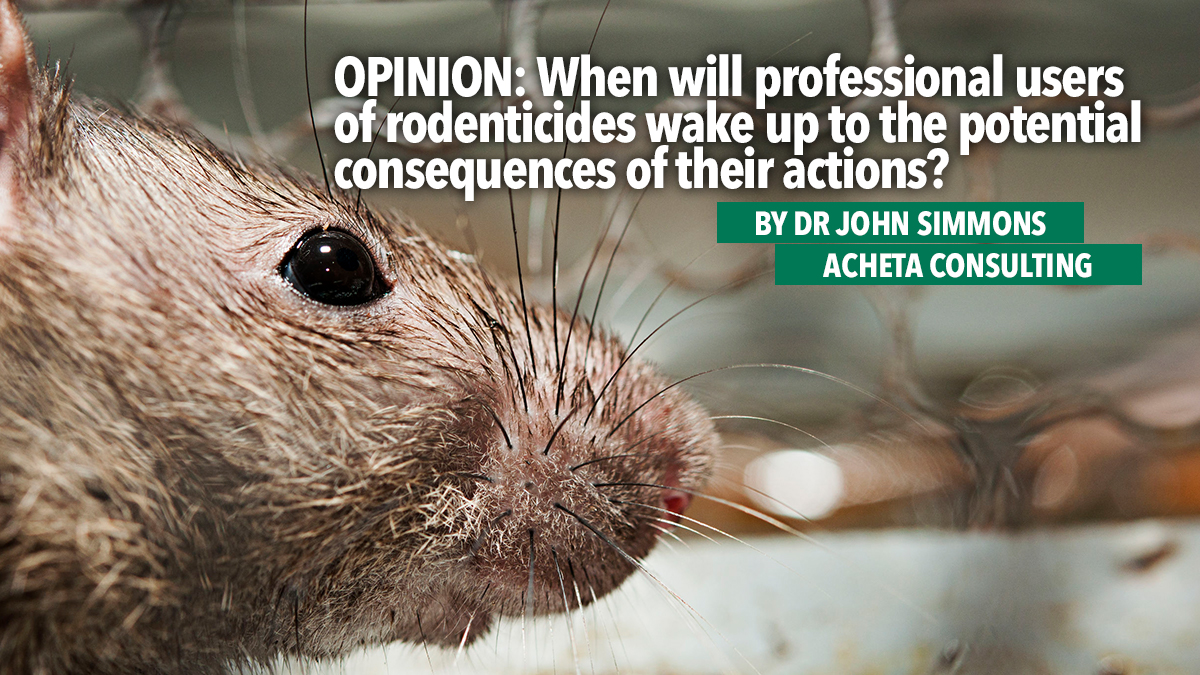Opinion| Rodenticide Resistance
Dr John Simmons, Acheta Consulting, writes about the consequences of not taking rodenticide resistance seriously following a CRRU statement about new survey results.

As part of our site inspections our team of consultants carry out an independent review of the quality of service provided by the incumbent pest control contractor.
In recent months Acheta’s consultants have highlighted, on far too many occasions, the inappropriate use of rodenticides, often combined with no (or an inappropriate) Environmental Risk Assessment. We have had several instances where the incumbent contractor has been vociferous in accusing us of being over-the-top in our demands.
A press release today by the Campaign for Responsible Rodenticide Use (CRRU) completely vindicates the line that we have taken.
To quote CRRU chairman Dr Alan Buckle:
CRRU research finds 58% of professional pest controllers say they are “not very” or “not at all” concerned about resistance.
He continues, "Everyone connected with rodenticide use needs to wake up to this issue, pay attention to the information available and change the way they use anticoagulant rodenticides accordingly.
"The onus is squarely on rodenticide users to maximise their knowledge and make responsible fact-based decisions about control measures. This can start, of course, with using the CRRU Code of Best Practice, as the basis of control measures. Every time before rodenticide bait is laid, users should ask themselves, will this active ingredient work here against this pest?”
The cornerstone of the rodenticide stewardship regime is the Code of Best Practice for the use of rodenticides published by CRRU UK in early 2015.
Application of rodenticides according to the code will prevent unnecessary exposure of wildlife and other non-target animals and help deliver the objectives of the regime. The aim is to ensure that all users of professional-only rodenticide baits comply with the CRRU Code of Best Practice and to work with assurance schemes to bring standards into alignment with the CRRU UK Code of Best Practice.
One of the primary criticisms that we often level when reviewing pest control service is that, because of genetic resistance to the active ingredient(s) being employed, pest control contractors are using rodenticides that we suspect (or sometimes know) are unlikely to work. Such use often continues for a prolonged period, when a simple test would indicate whether resistance genes are present.
In many cases there has not even been any reference made by the contractor to the resistance map of the UK, a freely available reference source detailing the currently known resistance status throughout the UK.
New 2019-2020 survey results show not only that 74% of rats analysed carried a resistance gene but, of those studied, one-in-five had two different genes in widespread locations: County Durham, West and East Yorkshire, Greater Manchester, Merseyside, Dorset and on the West/East Sussex border.
I’ll leave Dr Buckle to summarise the potential repercussions if current practice doesn’t change:
“Quite what this means for the future of pest rodent control would be inadvisable speculation right now. But it’s certainly bad and CRRU is examining the potential implications and strategies as a matter of utmost importance.”
Make no mistake, the best we can perhaps expect is further restriction on anticoagulant rodenticide use, whilst the ultimate sanction could be the complete removal of anticoagulant rodenticides from the market.
In Acheta we will continue to highlight bad practice for the serious issue that it undoubtedly is. Indeed, in future we will tighten our assessment of whether we believe rodenticide use on any specific site is both legal and appropriate. We make no apologies for taking this line.
Dr John Simmons
Business Unit Director, Acheta Consulting Ltd
20th October 2020
Source: Acheta release